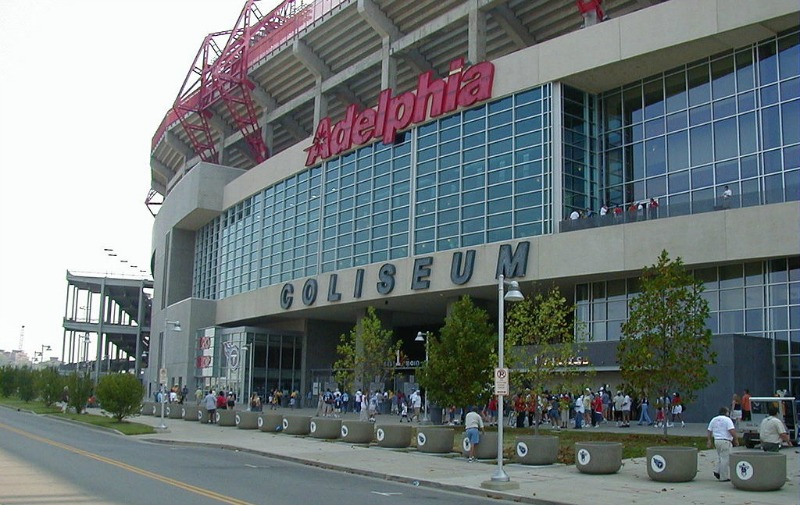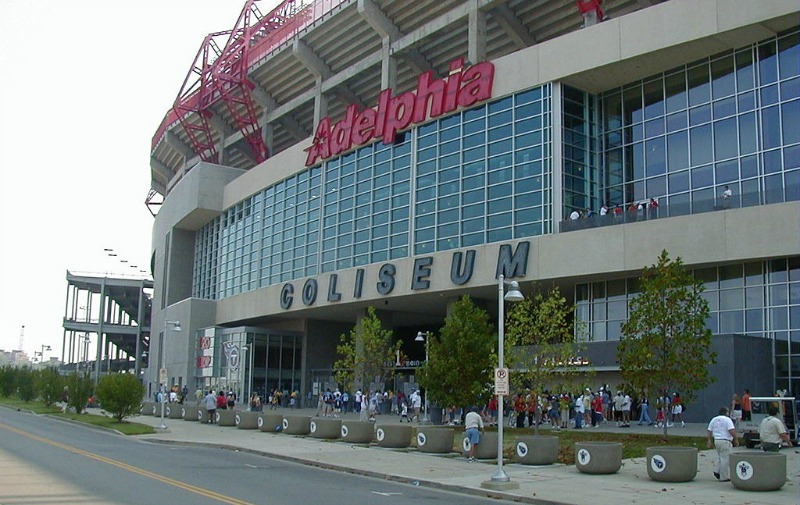Most professional sports stadiums used to be named after the teams that played there (Dodger Stadium, Tiger Stadium) or a person (Wrigley Field, Joe Robbie Stadium). But over the last 20 years or so, teams have developed a source of revenue by selling “naming rights” to their stadiums for millions of dollars. A corporation gets a stadium named after itself as a form of advertising…but what happens when that company goes out of business? (This article was first published in Uncle John’s Factastic Bathroom Reader. )
Adelphia Coliseum
The Tennessee Titans (formerly the Houston Oilers) started playing in Nashville in 1999 in the brand new Adelphia Coliseum. The naming rights were held by Adelphia Communications, at the time the fifth-largest cable TV provider in the U.S.…but the company was virtually unknown in Nashville. Adelphia shelled out $30 million for a 15-year contract, using the naming rights to advertise and position itself against the Nashville area’s dominant telecommunications company, BellSouth. The first sign of trouble came in 2002, when Adelphia failed to pay the stadium owners a quarterly payment of $500,000. A few weeks later, Adelphia filed for bankruptcy when an internal accounting scandal broke. The name Adelphia was dropped from the stadium, which was known as just the Coliseum for the next four years. In 2006, Nashville-based lumber company Louisiana Pacific picked up the rights—and the Titans now play on LP Field.
Enron Field
In 1999, shortly before the brand-new Ballpark at Union Station was scheduled to open for Houston Astros games, energy conglomerate Enron Corporation paid the team $100 million for the right to name the stadium Enron Field for 30 years. Then, two years later, Enron was exposed in one of the biggest accounting scandals in history. Financial statements were faked, shareholders were defrauded, and several executives were jailed. The company’s share price collapsed and Enron went bankrupt. To avoid being associated with the most loathed company in America, the Astros bought back the rights from Enron for just $2.1 million in early 2002. Naming rights were immediately sold to Minute Maid, a Houston-based subsidiary of Coca-Cola. The price: same as Enron paid, $100 million over 30 years.
The TWA Dome
Eight years after the NFL’s St. Louis Cardinals moved to Phoenix, St. Louis got a new football team in 1995, when the city successfully lured the Los Angeles Rams with a brand-new domed stadium. The costs associated with getting the Rams were offset by selling the naming rights of the complex to St. Louis–based Trans World Airlines for $1.3 million per year. Just one year later, TWA began a rapid decline precipitated by Chapter 11 bankruptcy restructuring and the crash of TWA flight 800, caused by a fuel tank explosion. TWA filed for a third (and final) bankruptcy in 2001. TWA’s assets were acquired by American Airlines, but the company did not assume naming rights in St. Louis. Since 2002, the St. Louis facility has been called the Edward Jones Dome, after the investment company.
ARCO Arena
The first team in the NBA to sell naming rights to its home arena was the Sacramento Kings. In 1988, the Sacramento Sports Arena became ARCO Arena, after the oil and gasoline company. The agreement expired in February 2011, and the rights were snatched up by a company called Power Balance—a manufacturer of bracelets that used “holographic technology” to make the wearer better at sports by “resonating and responding to the natural energy field of the body.” In other words—and according to multiple independent studies—hogwash. Less than a year after Power Balance bought the naming rights to the Sacramento arena, the company paid $57 million to settle a false advertising claims lawsuit and filed for Chapter 11 bankruptcy. As of 2012, the Kings play in the Sleep Train Arena, named for a locally headquartered mattress store chain.
PSINet Stadium
When the Internet became available for use outside of research institutions and the military in the late 1980s, PSINet was established as one of the very first online service providers, right alongside companies like CompuServe, Prodigy, and America Online. In 1995, just six years after its founding, PSINet was earning $33 million annually. But while it was growing, it wasn’t growing as fast—or earning the name recognition—as its competitors. To increase brand awareness, in 1999 the company bought the naming rights to the new Baltimore Ravens football stadium, less than 50 miles from PSINet corporate headquarters in northern Virginia. Within the year, the company had invested $1.4 billion to expand its services and build a fiber-optic network. Unfortunately, the moves were too aggressive…and used up too many financial resources (money) that the company didn’t have. PSINet filed for bankruptcy in 2002. The stadium was known as Ravens Stadium for a year, and in 2003 the naming rights were sold to M&T Bank (based in Buffalo, New York), which still owns them.










